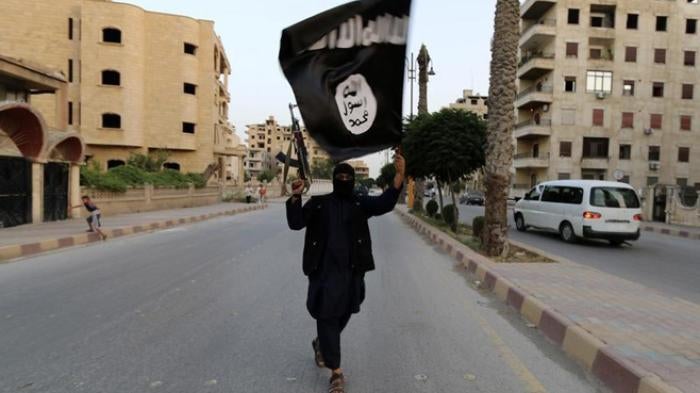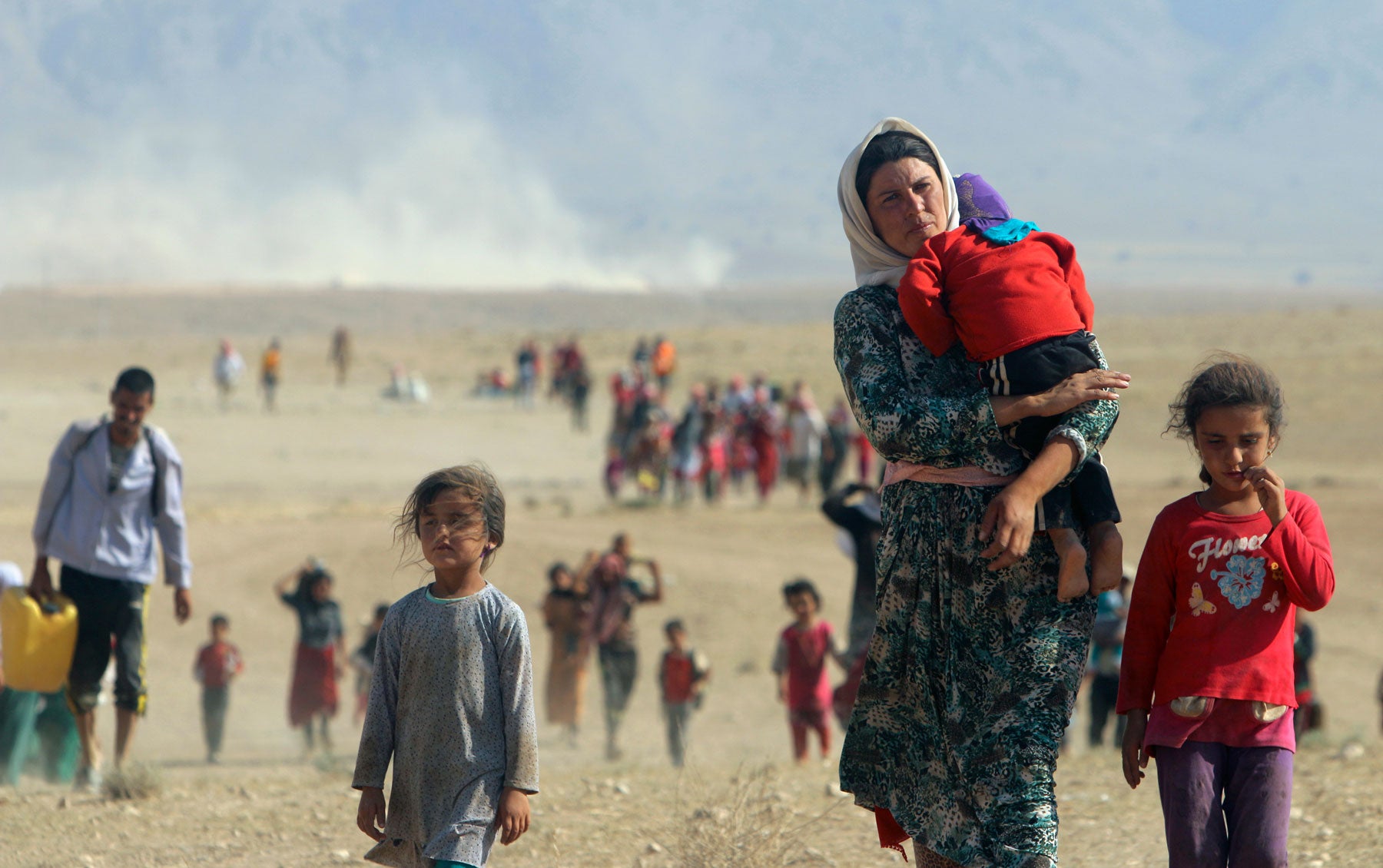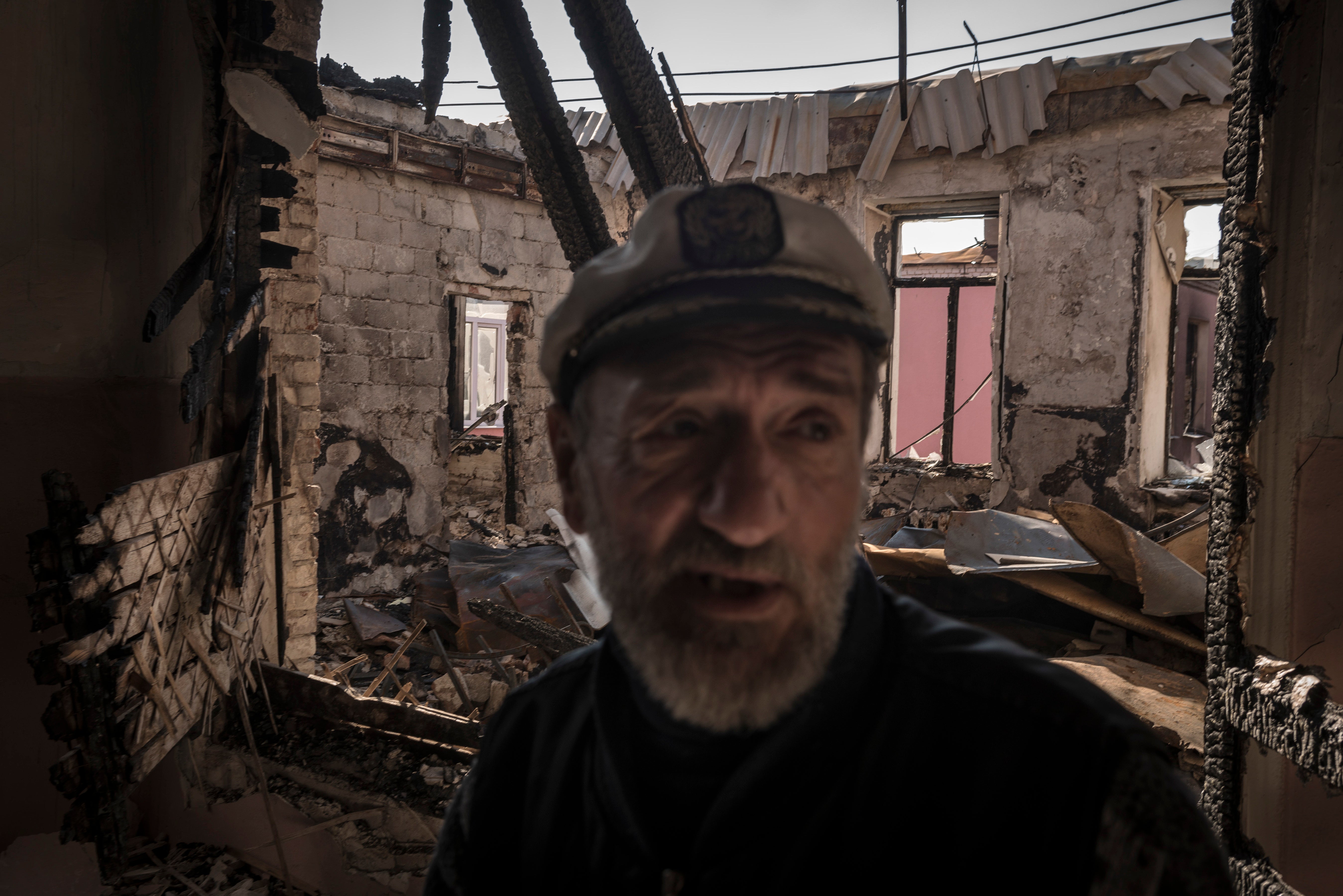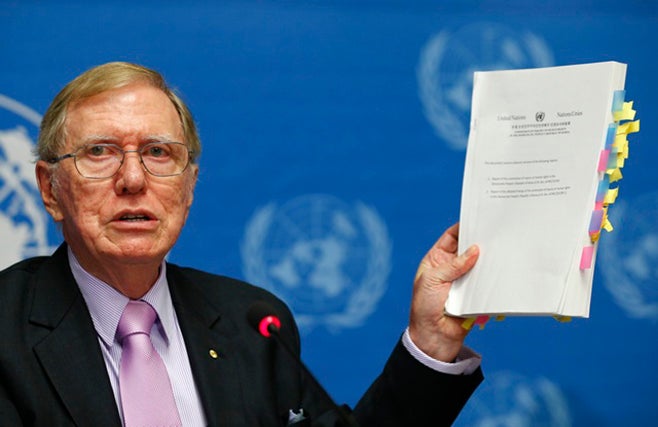In 2014, Syria’s armed conflict grew increasingly bloody with government and pro-government militias intensifying their attacks on civilian areas and continuing use of indiscriminate weapons. Government forces also continued to arbitrarily arrest, disappear, and torture detainees, many of whom died in detention. Non-state armed groups opposing the government also carried out serious abuses including deliberate and indiscriminate attacks on civilians, use of child soldiers, kidnapping, and torture in detention.
The extremist group Islamic State, also known as ISIS, and al-Qaeda’s affiliate in Syria, Jabhat al-Nusra, were responsible for systematic and widespread violations including targeting civilians, kidnappings, and executions.
According to then-United Nations High Commissioner for Human Rights Navi Pillay, as of August 2014, the death toll in the conflict reached more than 191,000 people. The spread and intensification of fighting have led to a dire humanitarian crisis with millions internally displaced or seeking refuge in neighboring countries.
Government Attacks on Civilians, Indiscriminate Use of Weapons
Following the August 2013 chemical weapons attack on Ghouta, near Damascus, international pressure resulted in Syria acceding to the Chemical Weapons Convention and agreeing to eliminate its declared chemical weapons. All of the declared chemical weapons were removed from Syria for destruction in 2014. But, justice remains elusive for the victims of the attack and evidence strongly suggests that Syrian government helicopters dropped barrel bombs embedded with cylinders of chlorine gas on three towns in Northern Syria in mid-April. These attacks used a common industrial chemical as a weapon, an act banned by the Chemical Weapons Convention.
The Syrian government’s extensive use of cluster munitions has caused numerous casualties and left a deadly legacy of explosive remnants of war. Human Rights Watch has identified at least 249 attacks in 10 of Syria’s 14 governates where cluster munitions were used between July 2012 and July 2014. At least seven types of cluster munitions were used, including air-dropped bombs, dispensers fixed to aircraft, and ground-launched rockets, and at least ten types of explosive submunitions. Evidence indicates that government forces used a powerful type of cluster munition rocket not seen before in the conflict in attacks on Keferzita, a town in northern Syria, in February. Cluster munitions appear to have been used again on August 21 by Syrian government forces in the town of Manbij in Aleppo governorate, reportedly killing at least six civilians and wounding another 40.
The government also persisted in dropping large numbers of high explosive barrel bombs on civilians in defiance of UN Security Council resolution 2139 passed on February 22. These unguided high explosive bombs are cheaply made, locally produced, and typically constructed from large oil drums, gas cylinders, and water tanks, filled with high explosives and scrap metal to enhance fragmentation, and then dropped from helicopters. Between February and July, there were over 650 new major impact strikes in Aleppo neighborhoods held by armed opposition groups. Most of the strikes had damage consistent with barrel bomb detonations. One local group estimated that aerial attacks had killed 3,557 civilians in Aleppo governorate in 2014.
The Syrian government also continues to impose sieges, which are estimated to affect over 200,000 civilians. The sieges are in violation of Security Council resolution 2139, which demands that all parties “immediately lift the sieges of populated areas,” including in Homs, Moadamiya and Daraya in Western Ghouta, Eastern Ghouta, and the Palestinian refugee camp in Yarmouk in south Damascus. The government has used siege strategies to effectively starve civilian populations into submission and force negotiations that would allow the government to retake territory.
Arbitrary Arrests, Enforced Disappearances, Torture, Deaths in Custody by Government Forces
Syrian security forces continue to detain people arbitrarily, regularly subjecting them to ill-treatment and torture, and often disappearing them using an extensive network of detention facilities throughout Syria. Many detainees were young men in their 20s or 30s; but children, women, and elderly people were also detained. In some instances, individuals reported that security forces detained their family members, including children, to pressure them to turn themselves in. On August 30, the Syrian Network for Human Rights, a local monitoring group, estimated that 85,000 people were currently being held by the government in conditions that amount to enforced disappearance.
Despite a general amnesty declared by the government in June, scores of civil society activists, human rights defenders, media, and humanitarian workers remain in arbitrary detention, some of whom are on trial, including before military and Anti-Terrorism courts, for exercising their rights. Some of the activists who remain in detention include freedom of expression advocate Bassil Khartabil, and human rights defender Mazen Darwish and his colleagues Hani Al-Zitani and Hussein Ghareer, from the Syrian Center for Media and Freedom of Expression. Some activists, like the lawyer and human rights defender Khalil Maatouk, whom former detainees report to have seen in government detention, continue to be held in conditions amounting to enforced disappearance.
Security Council resolution 2139 demands an end to the practices of arbitrary detention, disappearance, and abductions, and the release of everyone who has been arbitrarily detained.
Released detainees consistently report ill-treatment and torture in detention facilities and prison conditions that lead to many cases of deaths in custody. Four former detainees released from the Sednaya military prison in 2014 described deaths in custody and harsh prison conditions that closely match the allegations of mass deaths in custody by a military defector made in January, who photographed thousands of dead bodies in military hospitals in Damascus. At least 2,197 detainees died in custody in 2014, according to local activists.
Jabhat al-Nusra and ISIS Abuses
Extremist Islamist groups Jabhat al-Nusra and ISIS committed systematic rights abuses, including the intentional targeting and abduction of civilians, such as the abduction by ISIS forces in May of 153 Kurdish children. The children were later released.
Based on reports of local Kurdish officials and photographic evidence, ISIS forces used cluster munitions on July 12 and August 14 during fighting between ISIS and Kurdish forces of the People’s Protection Units (YPG) around the Syrian town of `Ayn al-`Arab, also known by its Kurdish name of Kobani, in Aleppo governorate near Syria’s northern border with Turkey.
On May 29, according to local accounts, ISIS forces executed at least 15 civilians, including seven children, after they entered the village of al-Taliliya near Ras al-`Ayn in northern Syria. After it took over the town of Bukamal in Deir al-Zour governorate in July, a resident reported that ISIS forces summarily executed an Alawite and Christian resident in the main square during the month of Ramadan. Summary executions of residents by ISIS forces were also reported in Raqqa and Tabka cities in Raqqa governorate in 2014. ISIS forces have also summarily executed some of its hostages including American journalists James Foley and Steven Sotloff in August and September, British aid workers David Haines and Alan Henning in September and October, and American aid worker Peter Kassig in November.
Jabhat al-Nusra has made repeated claims of responsibility for lethal car bombing attacks that have targeted civilians in Syria.
ISIS and Jabhat al-Nusra have imposed strict and discriminatory rules on women and girls and they have both actively recruited child soldiers. In Bukamal, during Ramadan 2014, ISIS forces also reportedly whipped anyone that was eating or drinking in public and during and after Ramadan whipped anyone seen walking in the streets during prayer times. Using the Internet, listening to music, and smoking were also forcibly banned.
Abuses by Other Non-State Armed Groups
Non-state armed groups have launched indiscriminate mortar and other artillery strikes from areas under their control that killed civilians in neighborhoods under government control. These attacks repeatedly hit known civilian objectives, including schools, mosques, and markets.
On April 29, two mortar shells struck the Badr el-Din Hussaini educational complex in the al-Shaghour neighborhood of Damascus, an area under government control, reportedly killing 17 children, at least two parents who came to pick up their children from the school, and injured approximately 50 people. The mortars came from an area under the control of armed groups in the Yarmouk camp.
Non-state armed groups including the Free Syrian Army and the Islamic Front are also using children for combat and other military purposes. They have also put students at risk by using schools as military bases, barracks, detention centers, and sniper posts.
Non-state armed groups have also been responsible for abductions. At least 54 Alawite women and children that were taken hostage during a military offensive in Latakia countryside in August 2013 continue to be held by “the Mujahadeen room in Latakia countryside.”
The prominent human rights defender, Razan Zeitouneh, and three of her colleagues, Wael Hamada, Samira Khalil, and Nazem Hammadi were abducted on December 9, 2013, in Douma, a city outside Damascus under the control of a number of armed opposition groups, including the Army of Islam. They continue to be held.
Despite the systematic nature of abuses by ISIS and Jabhat al-Nusra many other non-state armed groups in Syria have not ceased coordination and cooperation with these groups.
Areas Under Kurdish Rule
In January 2014, the Democratic Union Party and allied parties established a transitional administration in the three northern regions: `Afrin, `Ain al-`Arab, and Jazira. They have formed councils akin to ministries and introduced a new constitutional law. Authorities there have committed arbitrary arrests, due process violations, and failed to address unsolved killings and disappearances. The local police and military forces, the YPG also used child soldiers, although they made commitments in June to demobilize and stop the use of child soldiers.
Displacement Crisis
The UN estimates that 7.6 million Syrians are internally displaced and that 12.2 million need humanitarian assistance. In 2014, humanitarian aid agencies experienced significant challenges in getting assistance to the displaced civilian population and others badly affected by the conflict because of sieges imposed by both government and non-state armed groups, the government’s continuing refusal to allow assistance to come in across the border, and a general failure to guarantee security for humanitarian workers.
In July, a Security Council Resolution authorized deliveries of cross border humanitarian aid even without government permission.
As of September 3, 2014, over 3 million Syrians had registered or were pending registration as refugees with the UN Refugee Agency (UNHCR) in Lebanon, Jordan, Turkey, Iraq, and Egypt. In 2014, Iraq, Jordan, Turkey, and Lebanon all implemented measures to restrict the numbers of refugees entering their countries.
All four neighboring countries accepting Syrian refugees have denied Syrians secure legal status.
Palestinians from Syria have faced additional obstacles. They have been refused entry or forcibly deported from Jordan and some Palestinian-Jordanians who had been living in Syria had their Jordanian citizenship withdrawn. Palestinian refugees coming from Syria have also faced additional restrictions in Lebanon following new regulations by the Minister of Interior in May that limited Palestinians ability to enter the country or renew their residencies if they already were in the country.
In 2014, the number of refugees from Syria attempting to reach Europe, including through dangerous smuggling routes, has increased. While some European Union countries offer them safety, others such as Bulgaria and Greece have pushed back asylum seekers, sometimes violently, at their borders or from their territorial waters without allowing them to lodge asylum claims. Countries that do not neighbor Syria, including in the west have continued to only accept for resettlement small numbers of refugees.
At time of writing, only 51 percent of UNHCR’s appeal for the regional refugee response was funded, leaving a budget shortfall of more than US$1.8 billion. As a result, UNHCR, the World Food Program, and others have cut assistance to refugees, including the provision of basic goods and health care subsidies.
Key International Actors
While parties to the conflict and their international backers met in Switzerland for a second round of political negotiations known as Geneva II in January, the meetings did not result in any tangible outcomes and negotiations have not since resumed.
International efforts to ensure credible justice for serious crimes under international law on all sides in Syria have also proved elusive. On May 22, Russia and China blocked a Security Council resolution that would have referred the situation in Syria to the International Criminal Court (ICC). Over 100 nongovernmental organizations urged the Council to approve the resolution, more than 60 countries co-sponsored it, and 13 of the Council’s 15 members voted for it.
More than 140 nations have condemned Syria’s cluster munition use in statements and resolutions, including dozens of states not party to the Convention on Cluster Munitions. The UN General Assembly adopted Resolution 68/182 on 18 December 2013, expressing “outrage” at the “continued widespread and systematic gross violations of human rights” in Syria “including those involving the use of … cluster munitions.”
The Security Council did however pass a resolution on February 22 demanding safe and unhindered humanitarian access—including across conflict lines and across borders; that all parties cease “indiscriminate employment of weapons in populated areas, including shelling and aerial bombardment, such as the use of barrel bombs;” and an end to the practices of arbitrary detention, disappearance, and abductions, and the release of everyone who has been arbitrarily detained.
In light of the Syrian government’s continued non-compliance with the resolution, on July 14, the council passed a second resolution directly authorizing UN agencies and their implementing partners to deliver aid across Syria’s borders and conflict lines. No such follow up resolutions have been passed on detainees or indiscriminate attacks despite continued non-compliance with the resolution by all-parties to the conflict.
In addition to persistently blocking Security Council action to curb violations by the Syrian government, Russia, along with the Iranian government, continued to provide the Syrian government with military assistance in 2014, according to media reports .
On August 15, the Security Council passed resolution 2170 calling on all member states to take national measures to stop the flow of foreign fighters, financing, and arms to ISIS, Jabhat al-Nusra, and any other individual or group associate with al-Qaeda, and placed six individuals from these groups on the Al-Qaeda Sanctions List.
The Human Rights Council renewed the mandate of its independent International Commission of Inquiry on Syria in March 2014 for one year.
Countries neighboring Syria, and principally the Turkish government, have stepped up their border control policies to limit the flow of material and fighters to these groups but these measures were implemented after significant delay. Western states who fear their nationals are attempting to enter Syria to fight have also stepped up screening and other measures in an attempt to stem the flow of foreign fighters.
On September 24, the Security Council adopted resolution 2178, urging states to take a number of steps to counter terrorism including, that states should establish screening measures, effective border controls, and other measures to prevent the recruitment, organization, and movement of terrorists including those affiliated with ISIS and al-Qaeda affiliates. The resolution also urged that they improve cooperation, pursue prosecutions, improve assistance in pursuing prosecutions, and help build the capacity of other states to fight terror.
Individuals from Kuwait, Qatar, Saudi Arabia, and the United Arab Emirates have also financed and supported military operations led by ISIS or Jabhat al-Nusra. At the beginning of August, Kuwait announced new measures to curb funding for extremists. This included banning all fundraising in mosques, requiring greater transparency from charities regarding the source and destination of their donations, and obtainment of official receipts. Saudi Arabia has also taken new measures in the past year, announcing a royal decree to imprison Saudi nationals who fight abroad with terrorist groups in February, warning against donations to unauthorized groups in April, and pledging $100 million to establish a UN counterterrorism center in August.






